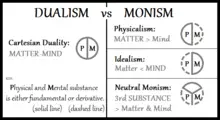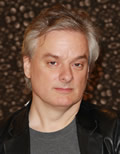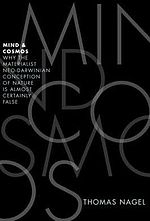|
TRANSLATE THIS ARTICLE
Integral World: Exploring Theories of Everything
An independent forum for a critical discussion of the integral philosophy of Ken Wilber
SEE MORE ESSAYS WRITTEN BY FRANK VISSER
Biased toward the Marvelous?
Integral Reflections on
Thomas Nagel's Mind and Cosmos
Frank Visser
Of course, just postulating the existence of mind does nothing to explain how it can interact with material reality.
Philosopher Thomas Nagel's latest book Mind and Cosmos—ominously sub-titled "Why the Materialist Neo-Darwinian Conception of Nature is Almost Certainly False"—invites reflections and comparisons from an integral perspective, given the similarity of this views with Ken Wilber's integral philosophy. Both defend the irreducibility of subjectivity against the materialist philosophy of mind which equates mind and brain. Both are very skeptical of the validity or at least the completeness of evolutionary theory to explain the marvelous complexities of Nature.
What is more, both postulate or at least flirt with the possibility of a cosmic force or tendency towards complexity and consciousness—though both are vague as to the nature and workings of this particular non-metaphysical influence. Nagel sees existence as "biased toward the marvelous" and as teleological (p. 92.). Wilber believes that "the universe is slightly tilted toward self-organizing processes".[1]
Contrary to Wilber, Nagel is a respected philosopher who at least gains attention of the mainstream press and of professional philosophers when he publishes his views on mind and morality. Most reviews of Mind and Cosmos were predictably negative. (See the "thumbs way down" review by geneticist Jerry Coyne from one end of the spectrum, to an overview and rebuttal of many reviews by conservative Christian philosopher Edward Feser). Much negativity is fueled, and justifiably so, I think, by the fact that Nagel, openly admitting he is not a specialist in the field of evolutionary theory, says he just wanted to articulate some common sense notions he deems valuable:
 Thomas Nagel
Thomas Nagel
“I would like to defend the untutored reaction of incredulity to neo-Darwinism … It is prima facie highly implausible that life as we know it is the result of a sequence of physical accidents together with the mechanism of natural selection”. (p. 5)
Common sense, however, is notoriously misleading when it comes to natural phenomena. One only has to realize that our senses dictate to us that the Sun goes around the Earth, and it took awhile for science to postulate, discover and prove that the opposite is the case. In the same vein, our subjective experiences look very different from the material phenomena science studies. However, we might be wrong again.
As an aside, Richard Dawkins, the arch-champion of neo-Darwinism, started an atheist bus campaign some years back using billboard signs on busses featuring: "There's probably no God (now stop worrying and enjoy your life)". One chapter from his The God Delusion was called "Why there almost certainly is no God". So we have a battle of probabilities here—what is highly unlikely and implausible for one philosopher is likely and plausible for an other, in this case a scientist. On a more serious note, the subtitle "Why the Materialist Neo-Darwinian Conception of Nature is Almost Certainly False" has probably been added by the publisher, to stir up some debate and cater to the anti-evolutionist or even creationist sections of society. Like Wilber, Nagel never engages the field of evolutionary science in any substantial way—though perhaps still more than Wilber has ever done.
 Dual-aspect theory is akin to neutral monism.
Dual-aspect theory is akin to neutral monism.
This diagram contrasts it with physicalism and
idealism, as well as Cartesian dualism.
Nagel's point of view regarding the nature of the mind is called neutral monism, or more specifically double-aspect theory. Instead of classical dualism, which postulates mind or soul and brain as separate entities, or modern-day materialism, which flatly denies the existence of the mind (and therefore the mind-body problem itself), double-aspect theory postulates a "third Something" which has both mind and brain as its aspects. Big advantage of this view is that the sphere of the mind is clearly acknowledged, at least in theory. But an even bigger disadvantage is that nobody has the faintest idea what this "third Something" is supposed to be, or how it has given rise to these mental (M) and physical (P) aspects. Some have equated it with God, some leave the whole question open. Wilber would say that Spirit, being equally distributed across the four quadrants, serves this purpose.
It has always surprised me that Wilber, who wrote a chapter in Integral Psychology about the mind-body problem—and even claims to have solved it, even if in an orthodox way by literally "dissolving it" in nondual consciousness—has never pointed to Nagel as a philosophical ally in these areas.[2] Of course, just postulating the existence of mind does nothing to explain how it can interact with material reality. The connection remains inherently mysterious. Wilber's model of the four quadrants is therefore more descriptive than explanatory. Other than almost all philosophers of mind, Wilber has argued that contrasting mind and brain is only half of the problem (the two upper quadrants), and should be complemented with the influences of culture and society on consciousness (the two lower quadrants). His is a tetra-aspect theory of consciousness.
 David Chalmers
David Chalmers
When I submitted Wilber's paper "An Integral Theory of Consciousness" to David Chalmer's huge online philosophy of mind repository some years ago, he filed it under "Miscellaneous"—hardly a sign of recognizing it as a world-shattering solution to the age-old mind-body problem. Now, in 2014, I can no longer locate it even there. Another kindred philosopher comparable to Wilber would have been Baruch Spinoza, who believed that "the Existence had two aspects, Extension and Mind, which together were to be taken as two of an infinite set of attributes comprising God (or, Nature)"[3]. Nagel's and even Spinoza's views are debated all over the world, but Wilber's "solution" to the mind-body problem, unfortunately, isn't.
Some years ago, David Chalmers gave this sobering view on the current status of the mind-body problem as follows:
I take it that all of the most important problems in the philosophy of mind are still open.... It seems to be in the nature of these problems that they are clarified rather than solved. Or perhaps they are solved to the satisfaction of an individual, or solved to the satisfaction of small groups or small communities. But they are never solved to the satisfaction of the philosophical community as a whole, for any extended period of time. Perhaps it is reasonable to doubt whether they ever will be. Instead, we might just end up with an increasingly good understanding of the fundamental disagreements on which debates over these issues turn, and with a conditional understanding of what one’s theory should look like given one’s view on these fundamental disagreements.[4]
In Mind and Cosmos Nagel extends his line of reasoning about the mind-body problem into a mind-cosmos problem, by arguing that, since material science can't explain mind or consciousness, it is essentially incomplete and should be complemented by some other philosophical notion of purpose or design. Even though evolutionary science would be able to explain the evolution of brains, it would still be unable to explain minds from brains. So according to Nagel, mind must be something intrinsic to the cosmos. Dualists have always had trouble to explain when and where exactly mind was connected to the body (or when the soul entered the body), but for philosophers like Nagel this problem doesn't arise: mind and body/brain are two aspects of the same Thing. Wilber takes the evolutionary position that both mind and brain have evolved, even down to the level of atoms.
Science, taking the outside-view of things, can only reconstruct the genesis of material organisms, culminating into human beings with brains. But what's exactly the difference between taking an evolutionary view which holds that neuronal complexity is a necessary precondition for consciousness to arise, and double-aspect theory which says that neuronal complexity and consciousness co-arise? In both cases, without material complexity nothing can be accomplished, and with it, consciousness seems to be inevitable as an outcome. And unfortunately, in both cases too, nobody knows how all this can be explained.
The strategy among these philosophers is to retreat backwards in time whenever science has solved another of the major problems of this field.
What is disheartening about these anti-evolutionary treatments (by both Nagel and Wilber) is that they never take the trouble, or the time, to engage evolutionary theory head-on. As I observed earlier [in "Wilber and Laszlo: Two Authors of Evolutionary Fiction"], the strategy among these philosophers, including Intelligent Design adherents, is to retreat backwards in time whenever science has solved another of the major problems of this field.
In the past, the human eye or the birds wing was touted as the insuperable obstacle to an evolutionary explanation—until that was solved by painstakingly reconstructing its evolutionary history, or at least by making such a history plausible by pointing to current intermediate forms that have survival value. Then, when eyes and wings were given over to science, biochemistry supposedly posed the same type of obstacle to scientific understanding—until again that field went to science, when everything from blood clotting to the immune system turned out to be amenable to scientific analysis. Then, the origin of life was see as the one problem science never could solve—notwithstanding that views range here from life as a freak accident to life as something to be expected (Kauffman). And then finally, the so-called fine-tuning of the cosmos is used as argument for the religious view that the universe is somehow bent on producing complexity and consciousness.
 Mind and Cosmos, 2012
Mind and Cosmos, 2012
Other than that this strategic retreat is cowardly, because it thrives only on problems science has not yet solved, and has no research programme of its own, it poses the question that, if the universe is somehow built for life, why does it seem so rare to us? Why don't other planets in our solar system teem with life? Is it because the conditions on those planets don't allow for the origin and evolution of life? But if conditions are so important, why not use these as sole explanations and do away with supernatural influences altogether? We should take the hypothesis of extra-natural influences as a last resort, when we have exhausted all possible naturalistic explanations, not as an a priori deeper Truth we cling to without having immersed ourselves in the details of a specific scientic area.
On the other hand, Nagel correctly points out that, as there is a "God of the gaps", invoked instinctively by religious believers whenever science seems unable to explain some natural phenomenon, there's a "Darwinism of the gaps" (p. 127), which is called on by evolutionists to "explain" features encountered in biological organisms by claiming them to be the product of natural selection. Before the evo-devo revolution, which clarified how limbs, eyes and appendages are built in mammals and insects, the origin of these complexities was always "explained" by natural selection. But in the past decades, genetic research has discovered natural selection "doesn't need to do all the work", for whole genetic toolkits for building these complexities are readily available, even in such primitive organisms that predate mammals and insects. Eyes were once thought to have evolved dozens of times in various lineages, through natural selection. These days, they are believed to have used one and the same genetic toolkit. Of course, far from providing an argument against Darwinian evolution, these recent discoveries make a naturalistic explanation of evolution even more plausible.
Compared to Nagel, Wilber seems to be much more careless in his metaphyical speculations. Where Wilber can proclaim that "evolution cries out for a spiritual explanation" or that the heavy elements can only have been generated due to some spiritual influence—for who could have foreseen Iron and Lead and Potassium at the time of the Big Bang? For sure, who could have foreseen anything at all: stars, galaxies, planets, life, mind, culture...—Nagel seems to be much more prudent and modest in his metaphysical speculations. Nagel may call himself an atheist and is not looking for spiritual explanations, but by rejecting "the materialistic neo-Darwinian conception of nature" he effectively sides with those spiritualists who do and equally refuses to really engage with this field of science. So does Wilber, in my opinion, even if he claims to be in his post-metaphysical phase and postulates a minimalist metaphysics, his intra-natural force of Eros in the Kosmos puts him outside the boundaries of academic discourse.
Notes
[1] Ken Wilber, Some Criticisms of My Understanding of Evolution, http://www.kenwilber.com/blog/show/390, December 04, 2007.
[2] Ken Wilber, Integral Psychology, chapter 14: "The 1-2-3 of consciousness". Shambhala, 2000.
[3] http://en.wikipedia.org/wiki/Double-aspect_theory
[4] David Chalmers, "Mind and Consciousness: Five Questions", In (P. Grim, ed) Mind and Consciousness: 5 Questions, . Automatic Press, 2008, http://consc.net/papers/five.pdf
|

 Frank Visser, graduated as a psychologist of culture and religion, founded IntegralWorld in 1997. He worked as production manager for various publishing houses and as service manager for various internet companies and lives in Amsterdam. Books: Ken Wilber: Thought as Passion (SUNY, 2003), and The Corona Conspiracy: Combatting Disinformation about the Coronavirus (Kindle, 2020).
Frank Visser, graduated as a psychologist of culture and religion, founded IntegralWorld in 1997. He worked as production manager for various publishing houses and as service manager for various internet companies and lives in Amsterdam. Books: Ken Wilber: Thought as Passion (SUNY, 2003), and The Corona Conspiracy: Combatting Disinformation about the Coronavirus (Kindle, 2020). 

